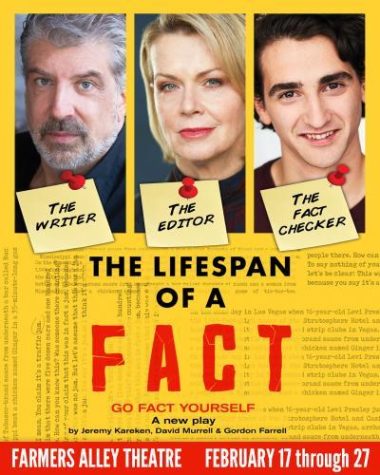What Happened There: “The Lifespan of a Fact” highlights the important division between fact and fiction
Credit: Becky Klose
“The Lifespan of a Fact” poses for a promotional photo. Laurie Carter Rose (left) looks over shamefully at the nervous Myles Schwarz (middle) and the annoyed Paul Stroili (right).
February 25, 2022
It was a gloomy yet bitterly cold evening on February 18, with downtown Kalamazoo having recently healed from a snow storm earlier that day: this was the time and place in which I went and saw “The Lifespan of a Fact” at the Farmers Alley Theatre, with the help of a generous Education for the Arts grant paying for the tickets for my journalism class.
That same night Eileen Gu won three olympic gold medals, my car was parked on the second floor of the Epic center parking ramp, and one journalistic mind would be changed forever.
As a journalist I can understand why the prior sentence might be hard to fact check, and as a media consumer yourself, you should really feel the same way.
Sure, you could look up the results of the olympics, and you could possibly haggle one of the Epic center parking ramp employees, but how can you fact check the foundation of a story I wrote with the last line: “one journalistic mind would be changed forever.”
The play “The Lifespan of a Fact” dives into this very question: is it more important to tell the truths of an event, or is it more important to tell an honorable yet relatable story?
The comedic yet insightful production brought to life at the Farmers Alley Theatre, stars Paul Stroili, Laurie Carter Rose and Myles Schwarz and was originally written for Broadway by Jeremy Kareken, David Murrell and Gordon Farrell.

The production debuted on Broadway in 2018 with Bobby Cannavale, Cherry Jones and Daniel Radcliffe rounding up the star-studded cast: however, from what I saw at Farmers Alley, the story still shines through without the likes of Harry Potter’s lead actor.
According to Farmers Alley playbill, the play can be summarized as, “Jim Fingal (Myles Schwarz) is a fresh-out-of-Harvard fact checker for a prominent, but sinking New York magazine. John D’Agata (Paul Stroili) is a talented writer with a transcendent essay about the suicide of a teenage boy—an essay that could save the magazine from collapse. When Jim is assigned to fact check D’Agata’s essay, the two come head to head in a comedic yet gripping battle over facts versus truth.”
“The Lifespan of a Fact” is a true story: one that not only characters but real people, Fengal and D’Agata, wrote about in their book that holds the same name.
Las Vegas news magazine, “The Believer” published D’Agata’s essay in question “What Happens There” in 2010 after a seven-year battle with the fact-checking Fengal.
The play begins the same way the essay does, “One summer… sixteen-year-old Levi Presley jumped from the observation deck of the 1,149-foot-high tower of the Stratosphere Hotel in Las Vegas.”
Immediately the play establishes itself with it’s serious subject matter of suicide; however, as the play continues, a quick-witted level of humor is introduced.
Fengal is eager to please when he takes his new job as fact checker for a New York publication under the direction of Emily Penrose (Laurie Carter Rose), which is the source of much of the play’s humor, along with the comedic battles between Fengal and D’Agata.
One of the ongoing jokes throughout the play is the fact that D’Agata does not consider his writings for publications as “articles.” If anything he takes extreme offense to it. His works of art are only to be considered “essays.”
Penrose fails to notify Fengal of this trait belonging to D’Agata in time before he begins to fact-check what he sees as an article, which D’Agata simply replies with “Article? I don’t write articles.”
The play also places a strong emphasis on humor through continuity: bringing up a previously mentioned joke such as the “article” versus “essay” bit in perfect comedic timing later on, which works wonderfully with the chemistry between Strolli and Schwarz.
“The Lifespan of a Fact” is rather chock full of dark humor with melancholy undertones, similar to a tragicomedy.
Conversley, the story handles the subject matter of suicide and the trauma of unpacking it with not only understanding, but solemness.
When Fengal and D’Agata argue about the essay, they begin to focus on the minute details of the essay. Getting to the point where they physically fight over something as simple as the color of the bricks of the building that Presely jumps from.

D’Agata insists that if the building that Presely jumps off of has red bricks or brown bricks doesn’t really matter when talking about a life that was recently lost. Penrose notices this and brings the two back into a level of reason by forcing them into reading the essay together in a beautiful resolution. Therefore, Penrose is the embodiment of compromise and understanding both sides of an argument: finding the gray in between.
Fengal and D’Agata realize the insensitivity of their arguments: this was in fact a young life they were discussing and should be thought of accordingly.
Strolli later commented after the show in a question and answer session on D’Agata speaking of Levi as a literary element as “distasteful” in the heat of argument, making D”Agata a wonderfully complex character and person to study. This moment of realization is an integral moment in the play, one where many audience members shed a tear, including Schwarz on stage.
Knight Life copy editor Gigi Fox teared up as well,“I don’t often cry, but when I saw Schwarz tear up, I couldn’t help it,” Fox said.
As director D. Terry Williams pointed out in a post-show question and answer session, this production marks one of the first returns to live theater in the area since the outset of the COVID-19 pandemic.
Knight Life Copy Editor Elias Nagel-Bennett spoke on the return to in person theatre stating that “there’s nothing like actually being there with the actors.”
One thing noticed initially by stepping into the Farmers Alley Theatre is that it is small, much smaller than expected, but that works perfectly for this play.
Being in a small theater actually felt like you were a journalist overhearing a passionate Fengal rant about his time at the Harvard’s Crimson, or that you were a houseplant in D’Agata’s abode.
Knight Life opinion editor Thea Pipe enjoyed the smaller, more intimate venue. “It was really cool to see that with such a small space they were able to put on such a large, impactful story,” Pipe said.
There were times in which Rose or Strolli were standing right next to me and my seat in stage left. I could feel the vibrations of their chests as they projected into the audience, and I could really feel their emotion.
The sets consisted of Penrose’s office and D’Agata’s Las Vegas home, with projections of emails and titles explaining the line of events that magnified the inclusivity of the production.
The play not only focuses on the conversations between the characters but their own personal thoughts and spaces of being.
In the question and answer session after the show, the cast and director were joined by professor of communication and journalism teacher Sue Ellen Christain from Western Michigan University, which all together offered an intellectual discussion of the message put forth.
Being able to see the cast and talk with them offered some closure at the end of the experience, and it also provided the most transformative message from that night, the one that “changed one journalistic mind forever.”
After being asked by an audience member what’s more important: telling the truth or telling a respectful story? Prof. Christain responded simply with “there can be both.”
“Lifespan of a Fact” helps writers realize that they can tell a story with agents of fact, rather than finding an unhealthy compromise, which some may find comfort in knowing that the story presented in “The Lifespan of a Fact” answers the same dilemma of story versus truth.
The story is not only vital for journalists to hear, but for anyone who consumes media and lets it influence their lives.
“The Lifespan of a Fact” at Farmers Alley Theatre runs throughout this weekend, with tickets available at 7:30 p.m. on February 25 and 26, and a 2:00 p.m. matinee on Feb. 27.
As the play points out, time is of the essence, and this 90 minute play is worth that time, knowing the message will stick with you for a lifespan.












